Vasoactive Intestinal Peptide (VIP) is a neuropeptide that plays an important role in regulating various physiological functions, especially in the pulmonary system. As the need for better treatments for chronic lung diseases grows, VIP’s role in lung health has gained more attention.
Studies show that VIP peptide, as a promising therapy for lung diseases, can influence processes like bronchodilation, anti-inflammatory activity, and immune regulation. This makes it a key area of focus in pulmonary health research.
For individuals suffering from chronic lung diseases like asthma, Chronic Obstructive Pulmonary Disease (COPD), and pulmonary fibrosis, VIP’s potential as a treatment is especially promising. These diseases often involve chronic inflammation, airway constriction, and lung tissue damage.
Because of this, managing these conditions effectively is crucial. While VIP’s role is still under research, early findings show that it may offer significant benefits in treating these diseases.
This article will explore the effects of Vasoactive Intestinal Peptide (VIP) on pulmonary health, including its mechanisms, benefits, and possible use in treating chronic lung diseases like COPD and asthma.
VIP peptide’s ability to handle inflammation, immune response, and airway constriction in lung diseases is a key reason why it might be a breakthrough in managing respiratory diseases.
Explore VIP Peptide from Direct Peptides Slovakia, a neuropeptide that supports bronchodilation, reduces inflammation, and enhances lung function for better airflow and breathing.
Chronic inflammation is a central problem in diseases like asthma and COPD. The immune system’s overreaction to irritants or allergens leads to long-term damage in the lungs. So, how does VIP peptide help control inflammation and reduce damage in the lungs?
VIP peptide’s anti-inflammatory properties are some of its most powerful effects. In both asthma and COPD, inflammation in the airways causes narrowing, extra mucus production, and less lung function.
Vasoactive Intestinal Peptide (VIP) controls this inflammatory response by blocking pro-inflammatory cytokines like TNF-α and IL-6, which fuel inflammation. At the same time, VIP encourages the production of anti-inflammatory cytokines such as IL-10, helping to calm down the overall inflammatory response.
In asthma, this means fewer flare-ups, less airway remodeling (where constant inflammation leads to permanent changes in the airways), and possibly better lung function. For COPD patients, whose inflammation is more constant and progressive, VIP’s ability to control inflammation might slow down disease progression, lower flare-ups, and improve quality of life.
By directly addressing inflammation, VIP sets up a better immune response, another key factor in treating diseases like asthma and COPD. Its role in balancing immune responses helps keep lung health intact without damaging healthy tissue.
As we continue, VIP peptide’s bronchodilatory effects are also important in improving airflow and lung function, which is critical in both asthma and COPD treatment.
Explore Peptide Supplies at Direct Peptides Slovakia for all your reconstitution requirements.
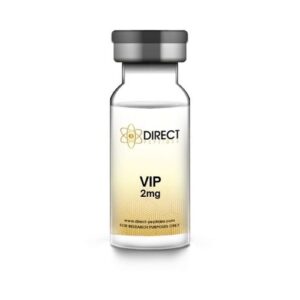 Along with its anti-inflammatory and bronchodilatory effects, VIP peptide also plays a key role in immune modulation—important for keeping a balanced immune response in the lungs. But how does Vasoactive Intestinal Peptide (VIP) affect the immune system, and why is this important for lung health?
Along with its anti-inflammatory and bronchodilatory effects, VIP peptide also plays a key role in immune modulation—important for keeping a balanced immune response in the lungs. But how does Vasoactive Intestinal Peptide (VIP) affect the immune system, and why is this important for lung health?
In diseases like asthma, COPD, and pulmonary fibrosis, the immune system can become unbalanced, reacting too strongly to harmless substances like allergens or irritants. This overreaction worsens inflammation, damages tissues, and pushes the disease forward.
Vasoactive Intestinal Peptide (VIP) helps control the immune response by influencing immune cells like macrophages, dendritic cells, and T-cells. This helps prevent immune cells from becoming overactive, which can lead to more inflammation and lung damage.
In asthma, for example, VIP helps limit the overproduction of inflammatory molecules and prevents immune cells from contributing to airway narrowing.
In COPD, VIP’s ability to regulate immune function could stop the immune system from attacking lung tissue, possibly slowing disease progression and preserving lung function.
Vasoactive Intestinal Peptide (VIP) works as an immune regulator in the lungs, making sure the immune system stays effective without causing unnecessary harm.
This balancing act, along with its anti-inflammatory effects, makes vasoactive intestinal peptide (VIP) a promising treatment for chronic lung diseases, handling both inflammation and immune problems. These same qualities also contribute to VIP’s potential use in peptide therapy for lung diseases, boosting its clinical applications.
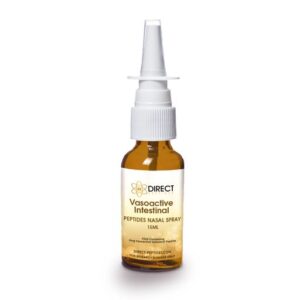 Asthma is a long-term respiratory condition that causes inflammation and narrowing of the airways, making breathing difficult. So, how can vasoactive intestinal peptide (VIP) help manage asthma symptoms and improve lung function?
Asthma is a long-term respiratory condition that causes inflammation and narrowing of the airways, making breathing difficult. So, how can vasoactive intestinal peptide (VIP) help manage asthma symptoms and improve lung function?
In asthma, the airways become sensitive to triggers like allergens or irritants. When these triggers appear, the immune system releases inflammatory substances that cause the airways to tighten and swell.
VIP peptide’s ability to relax the bronchial muscles and reduce inflammation makes it a helpful tool in managing asthma. By relaxing the smooth muscles in the bronchial tubes, VIP opens the airways, improving airflow and reducing narrowing.
Additionally, VIP helps control the inflammation in the airways, leading to fewer and less severe asthma flare-ups. VIP peptide’s immune-modulating effects make asthma management even better by stopping the immune system from overreacting to harmless substances. This keeps asthma symptoms in check, resulting in improved lung function and a better quality of life for patients.
This same immune regulation also applies to managing COPD, as both diseases involve chronic inflammation of the airways and immune system imbalance. VIP’s potential as a treatment makes it crucial for managing a range of chronic lung conditions.
Asthma isn’t the only condition where vasoactive intestinal peptide (VIP) shows promise. For patients suffering from COPD, VIP’s bronchodilatory and anti-inflammatory effects offer even more hope.
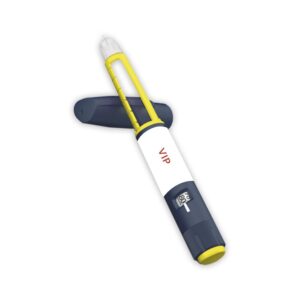 Chronic Obstructive Pulmonary Disease (COPD) is a progressive lung disease that causes long-term breathing issues due to constant exposure to irritants, like tobacco smoke. How does VIP peptide help manage COPD symptoms and improve lung function?
Chronic Obstructive Pulmonary Disease (COPD) is a progressive lung disease that causes long-term breathing issues due to constant exposure to irritants, like tobacco smoke. How does VIP peptide help manage COPD symptoms and improve lung function?
COPD leads to airway blockage, thickening of the bronchial walls, and extra mucus production. These factors result in chronic coughing, shortness of breath, and trouble doing everyday activities.
VIP peptide’s bronchodilatory effects help relieve COPD symptoms by relaxing the airway muscles, improving airflow, and reducing airway narrowing. This offers significant relief for COPD patients, helping them breathe easier and reducing restrictions on daily activities.
VIP peptide’s anti-inflammatory effects also support COPD management by reducing long-term inflammation in the lungs.
By controlling pro-inflammatory cytokines and boosting anti-inflammatory cytokines, vasoactive intestinal peptide (VIP) may help slow disease progression and lower flare-ups, improving the patient’s quality of life.
In this way, VIP’s effects complement immune modulation, contributing to both short-term relief and long-term disease management. This makes VIP peptide a key part of COPD treatment options, helping patients manage a progressive condition more effectively.
While asthma and COPD may be the most well-known applications of VIP, its potential extends to other chronic lung diseases, including pulmonary fibrosis, where lung tissue scarring is the primary concern.
Pulmonary fibrosis is a condition where lung tissue becomes scarred and stiff, making it harder for the lungs to expand and contract. This leads to poor oxygen exchange and reduced lung function. How could VIP peptide help manage pulmonary fibrosis and slow lung scarring?
Pulmonary fibrosis happens when fibroblasts—cells that create collagen and other extracellular components—become overly active, leading to scar tissue. Vasoactive Intestinal Peptide (VIP) has shown potential in stopping fibroblast activation, reducing collagen buildup, and slowing fibrosis.
Additionally, VIP’s anti-inflammatory effects help control the inflammation that often comes before fibrosis, reducing the response that causes scarring. VIP peptide’s ability to regulate both immune responses and fibrosis makes it a promising treatment for idiopathic pulmonary fibrosis (IPF) and other lung diseases.
While Slovakia research is still ongoing, vasoactive intestinal peptide (VIP) could offer double benefits by controlling both inflammation and scarring, improving lung function and quality of life for patients.
This potential also aligns with work done by other peptides like Thymalin, B7-33, and Thymosin Beta-4 (Tβ4), which address different aspects of lung disease, such as immune control, inflammation reduction, and tissue regeneration.
While Vasoactive Intestinal Peptide (VIP) is showing great promise in managing chronic lung diseases, other peptides are also being studied for their potential to improve lung health. These include Thymalin, B7-33, and Thymosin Beta-4 (Tβ4).
Each of these peptides targets key aspects of lung function, such as immune modulation, inflammation control, and tissue repair, offering new possibilities for treating chronic pulmonary diseases.
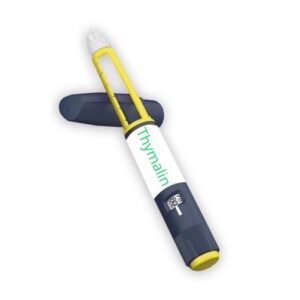 Thymalin, a peptide from the thymus gland, helps regulate immune function, which is crucial for lung health. Thymalin boosts the activity of T-cells, which are essential for immune responses to infections and inflammation.
Thymalin, a peptide from the thymus gland, helps regulate immune function, which is crucial for lung health. Thymalin boosts the activity of T-cells, which are essential for immune responses to infections and inflammation.
In asthma and COPD, where the immune system is out of balance, Thymalin helps restore normal immune responses, reducing inflammation and preventing tissue damage.
Thymalin’s immune-regulating effects, combined with vasoactive intestinal peptide (VIP), could provide extra support in managing diseases driven by immune system issues, like asthma and COPD. This approach targets both immune and inflammatory pathways, giving a more comprehensive treatment.
Discover Thymalin Peptide from Direct Peptides Slovakia, an immune-modulating peptide that helps regulate immune responses and reduces excessive inflammation in the lungs.
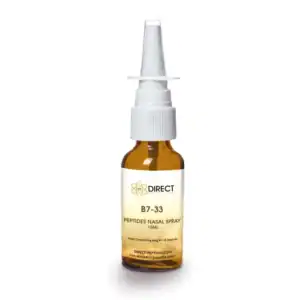 B7-33 is a peptide being studied for its potential to cut down on inflammation and prevent fibrosis in the lungs. In diseases like idiopathic pulmonary fibrosis (IPF), where scar tissue replaces healthy lung tissue, B7-33 might offer a treatment by stopping inflammation and fibroblast activation.
B7-33 is a peptide being studied for its potential to cut down on inflammation and prevent fibrosis in the lungs. In diseases like idiopathic pulmonary fibrosis (IPF), where scar tissue replaces healthy lung tissue, B7-33 might offer a treatment by stopping inflammation and fibroblast activation.
Together with VIP peptide’s bronchodilatory and anti-inflammatory effects, B7-33 could help preserve lung function and improve patient outcomes.
Check out B7-33 Peptide from Direct Peptides Slovakia, a peptide that targets inflammation and fibrosis, helping to reduce scar tissue formation and preserve lung function.
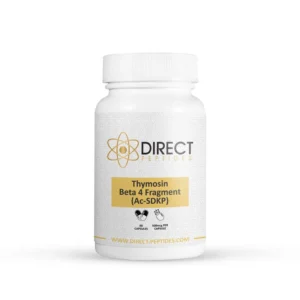 Thymosin Beta-4 (Tβ4) is known for its regenerative abilities. In diseases like pulmonary fibrosis and acute lung injury (ALI), Tβ4 helps tissue repair and reduces scarring.
Thymosin Beta-4 (Tβ4) is known for its regenerative abilities. In diseases like pulmonary fibrosis and acute lung injury (ALI), Tβ4 helps tissue repair and reduces scarring.
Its ability to regrow functional lung tissue, combined with VIP peptide’s anti-inflammatory effects and B7-33’s fibrosis inhibition, creates a comprehensive approach to treating chronic lung diseases.
As research continues to evolve, the possibility of peptide-based therapies transforming pulmonary health seems increasingly within reach.
The combination of VIP and other peptides presents an exciting frontier in managing chronic lung diseases.
Explore Thymosin Beta-4 Peptide from Direct Peptides Slovakia, a tissue-regenerating peptide that promotes cell migration and accelerates lung tissue repair and regeneration.
The combined effects of VIP peptide and other peptides like Thymalin, B7-33, and Thymosin Beta-4 (Tβ4) offer an exciting future in pulmonary disease treatment. Each peptide works on different aspects of lung function—from immune control to inflammation management and tissue regeneration—potentially leading to more effective treatments.
Although these peptides are still in the research phase, ongoing studies suggest they could greatly improve treatment options for chronic lung diseases like asthma, COPD, and pulmonary fibrosis.
The future of pulmonary health research is bright, with the synergy between these peptides holding the potential to change how we treat respiratory diseases.
[1] Delgado M, Ganea D. Vasoactive intestinal peptide: a neuropeptide with pleiotropic immune functions. Amino Acids. 2013 Jul;45(1):25-39.
[2] Delgado M, Abad C, Martinez C, Juarranz MG, Arranz A, Gomariz RP, Leceta J. Vasoactive intestinal peptide in the immune system: potential therapeutic role in inflammatory and autoimmune diseases. J Mol Med (Berl). 2002 Jan;80(1):16-24.
[3] Wu D, Lee D, Sung YK. Prospect of vasoactive intestinal peptide therapy for COPD/PAH and asthma: a review. Respir Res. 2011 Apr 11;12(1):45.
[4] Mathioudakis A, Chatzimavridou-Grigoriadou V, Evangelopoulou E, Mathioudakis G. Vasoactive intestinal Peptide inhaled agonists: potential role in respiratory therapeutics. Hippokratia. 2013 Jan;17(1):12-6.
[5] da Silva AL, de Oliveira GP, Kim N, Cruz FF, Kitoko JZ, Blanco NG, Martini SV, Hanes J, Rocco PRM, Suk JS, Morales MM. Nanoparticle-based thymulin gene therapy therapeutically reverses key pathology of experimental allergic asthma. Sci Adv. 2020 Jun 10;6(24):eaay7973.
[6] Welch NG, Mukherjee S, Hossain MA, Praveen P, Werkmeister JA, Wade JD, Bathgate RAD, Winkler DA, Thissen H. Coatings Releasing the Relaxin Peptide Analogue B7-33 Reduce Fibrotic Encapsulation. ACS Appl Mater Interfaces. 2019 Dec 11;11(49):45511-45519.
[7] Conte E, Genovese T, Gili E, Esposito E, Iemmolo M, Fruciano M, Fagone E, Pistorio MP, Crimi N, Cuzzocrea S, Vancheri C. Protective effects of thymosin β4 in a mouse model of lung fibrosis. Ann N Y Acad Sci. 2012 Oct;1269:69-73.
Shop ALL Peptide Vials from Direct Peptides Slovakia today, your trusted supplier of premium clinical grade peptides online.

Thymalin Pre-Mixed Pen 20mg Peptide
£33.59 – £90.63Price range: £33.59 through £90.63 Select options This product has multiple variants. The options may be chosen on the product page
B7-33 Nasal Spray
£40.10 – £75.20Price range: £40.10 through £75.20 Select options This product has multiple variants. The options may be chosen on the product page
VIP Peptide Vial
£16.79 – £25.77Price range: £16.79 through £25.77 Select options This product has multiple variants. The options may be chosen on the product page
Thymosin Beta-4 Fragment Capsules
£115.00 Add to cartALL CONTENT AND PRODUCT INFORMATION AVAILABLE ON THIS WEBSITE IS FOR EDUCATIONAL PURPOSES ONLY.
DISCLAIMER: These products are intended solely as a research chemical only. This classification allows for their use only for research development and laboratory studies. The information available on our Slovakia Direct Peptides website: https://direct-peptides.com is provided for educational purposes only. These products are not for human or animal use or consumption in any manner. Handling of these products should be limited to suitably qualified professionals. They are not to be classified as a drug, food, cosmetic, or medicinal product and must not be mislabelled or used as such.